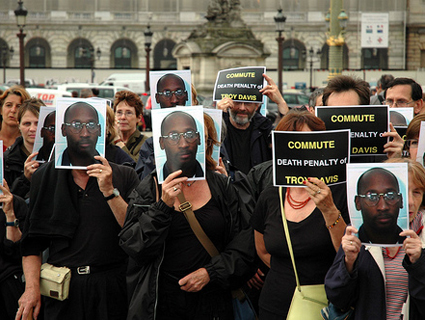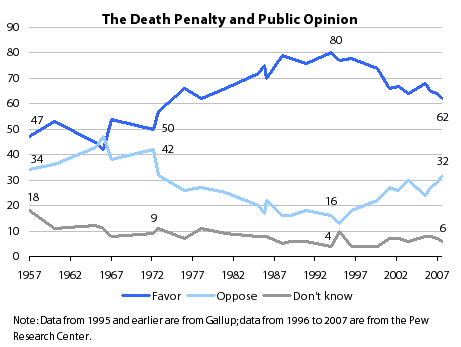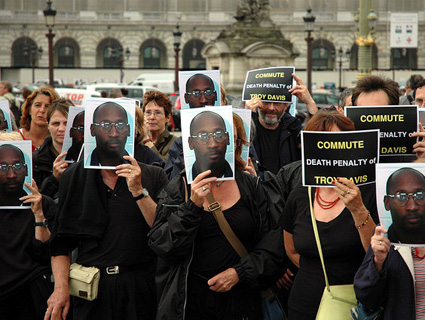
Supporters of Troy Davis rally in Paris.<a href="http://en.wikipedia.org/wiki/File:Troy_Davis_Paris_demo.jpg">Photographer</a>/Wikimedia Commons
The state of Georgia is scheduled to execute Troy Davis sometime after 7 p.m. tonight, even though there are serious doubts as to whether he ever committed the crime he was convicted of (seven of the nine witnesses at his trial have since recanted). The debate over capital punishment has picked up noticabely over the last month, with the Davis execution, the Supreme Court’s intervention in the case of Texas death row inmate Duane Buck, and Texas Governor Rick Perry’s insistence—in the face of overwhelming evidence to the contrary—that the state has never executed an innocent man on his watch. In an editorial today, the New York Times takes the occasion to call for capital punishment to be permanently abolished.
They make a pretty compelling case. But this might not be a fight they can win—at least not for a while. Some death penalty supporters believe that the government is infallible when it comes to doling out capital punishment. But the numbers show that even people who think the state sometimes gets the wrong guy are still likely to support the death penalty. Here’s a 2009 Gallup poll, via Grits for Breakfast:
[F]or many Americans, agreement with the assertion that innocent people have been put to death does not preclude simultaneous endorsement of the death penalty. A third of all Americans, 34%, believe an innocent person has been executed and at the same time support the death penalty. This is higher than the 23% who believe an innocent person has been executed and simultaneously oppose the death penalty.
It’s comforting (ish) to think that death penalty supporters just have their heads in the sand, and if they can just be convinced that the system is broken they’ll come around to abolition. But that’s really not the case; a substantial number of proponents just think a flawed conviction here and there is a small price to pay for justice. Even as folks like the Innocence Project and Pamela Colloff continue to shine a light on the flaws of the system, public support for capital punishment remains pretty high and there’s no indication it’s in danger of flipping. Here’s a handy chart from Pew:
 Courtesy of Pew ResearchWe have a notable decline over the last decade (coinciding with the switch in pollsters) but nothing about this graph screams out that the death penalty is on its last legs, and that it’s not just a regression to the mean. This one from Gallup is even more ambiguous:
Courtesy of Pew ResearchWe have a notable decline over the last decade (coinciding with the switch in pollsters) but nothing about this graph screams out that the death penalty is on its last legs, and that it’s not just a regression to the mean. This one from Gallup is even more ambiguous:
 Courtesy of GallupThe takeaway here is that even with cases like those of Troy Davis and Cameron Todd Willingham, death penalty opponents are going to have a pretty tough time winning converts to their cause. But there’s plenty of low-hanging fruit to go after: The Davis prosecution, for instance, was aided by a flawed system of witness idenfitification—one that that the New Jersey Supreme Court recently banned entirely. The Willingham case hinged on a school of arson science that was closer to witchcraft—but a consequence of that is the state was pressured into forming a commission that now has the authority to investigate cases where poor forensic techniques were used.
Courtesy of GallupThe takeaway here is that even with cases like those of Troy Davis and Cameron Todd Willingham, death penalty opponents are going to have a pretty tough time winning converts to their cause. But there’s plenty of low-hanging fruit to go after: The Davis prosecution, for instance, was aided by a flawed system of witness idenfitification—one that that the New Jersey Supreme Court recently banned entirely. The Willingham case hinged on a school of arson science that was closer to witchcraft—but a consequence of that is the state was pressured into forming a commission that now has the authority to investigate cases where poor forensic techniques were used.
Update: More numbers from PRRI today. There’s also an enthusiasm gap: “Three times as many Americans say they strongly favor the death penalty as say they strongly oppose it (33% vs. 11% respectively).”















